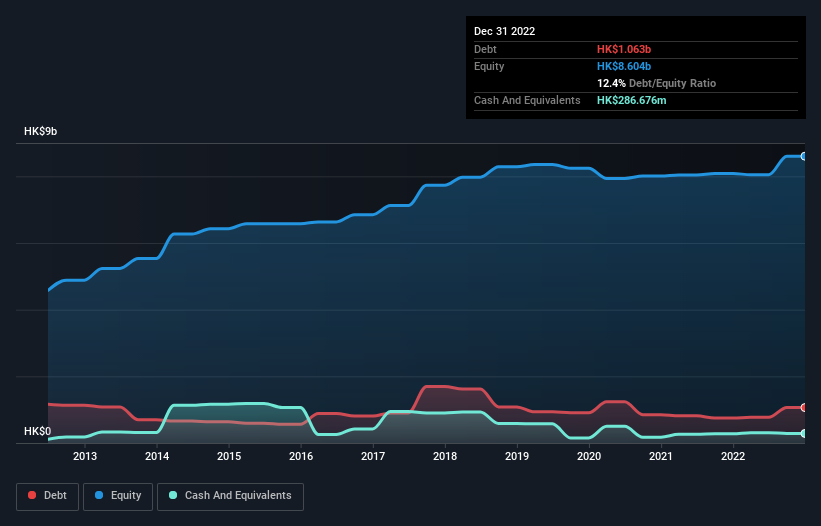
David Iben put it well when he said, 'Volatility is not a risk we care about. What we care about is avoiding the permanent loss of capital.' When we think about how risky a company is, we always like to look at its use of debt, since debt overload can lead to ruin. Importantly, Shun Ho Property Investments Limited (HKG:219) does carry debt. But should shareholders be worried about its use of debt?
When Is Debt Dangerous?
Debt assists a business until the business has trouble paying it off, either with new capital or with free cash flow. If things get really bad, the lenders can take control of the business. However, a more common (but still painful) scenario is that it has to raise new equity capital at a low price, thus permanently diluting shareholders. Having said that, the most common situation is where a company manages its debt reasonably well - and to its own advantage. The first thing to do when considering how much debt a business uses is to look at its cash and debt together.
Check out our latest analysis for Shun Ho Property Investments
What Is Shun Ho Property Investments's Debt?
As you can see below, at the end of December 2022, Shun Ho Property Investments had HK$1.06b of debt, up from HK$749.1m a year ago. Click the image for more detail. However, because it has a cash reserve of HK$286.7m, its net debt is less, at about HK$776.0m.

How Healthy Is Shun Ho Property Investments' Balance Sheet?
The latest balance sheet data shows that Shun Ho Property Investments had liabilities of HK$194.9m due within a year, and liabilities of HK$1.17b falling due after that. On the other hand, it had cash of HK$286.7m and HK$23.4m worth of receivables due within a year. So its liabilities total HK$1.06b more than the combination of its cash and short-term receivables.
This deficit casts a shadow over the HK$639.5m company, like a colossus towering over mere mortals. So we'd watch its balance sheet closely, without a doubt. After all, Shun Ho Property Investments would likely require a major re-capitalisation if it had to pay its creditors today.
We measure a company's debt load relative to its earnings power by looking at its net debt divided by its earnings before interest, tax, depreciation, and amortization (EBITDA) and by calculating how easily its earnings before interest and tax (EBIT) cover its interest expense (interest cover). Thus we consider debt relative to earnings both with and without depreciation and amortization expenses.
Shun Ho Property Investments's net debt to EBITDA ratio of about 2.4 suggests only moderate use of debt. And its strong interest cover of 15.6 times, makes us even more comfortable. It is well worth noting that Shun Ho Property Investments's EBIT shot up like bamboo after rain, gaining 79% in the last twelve months. That'll make it easier to manage its debt. The balance sheet is clearly the area to focus on when you are analysing debt. But you can't view debt in total isolation; since Shun Ho Property Investments will need earnings to service that debt. So when considering debt, it's definitely worth looking at the earnings trend. Click here for an interactive snapshot.
Finally, while the tax-man may adore accounting profits, lenders only accept cold hard cash. So we clearly need to look at whether that EBIT is leading to corresponding free cash flow. Over the last three years, Shun Ho Property Investments actually produced more free cash flow than EBIT. There's nothing better than incoming cash when it comes to staying in your lenders' good graces.
Our View
Based on what we've seen Shun Ho Property Investments is not finding it easy, given its level of total liabilities, but the other factors we considered give us cause to be optimistic. In particular, we are dazzled with its interest cover. Looking at all this data makes us feel a little cautious about Shun Ho Property Investments's debt levels. While we appreciate debt can enhance returns on equity, we'd suggest that shareholders keep close watch on its debt levels, lest they increase. When analysing debt levels, the balance sheet is the obvious place to start. But ultimately, every company can contain risks that exist outside of the balance sheet. For instance, we've identified 3 warning signs for Shun Ho Property Investments (1 is significant) you should be aware of.
When all is said and done, sometimes its easier to focus on companies that don't even need debt. Readers can access a list of growth stocks with zero net debt 100% free, right now.
New: Manage All Your Stock Portfolios in One Place
We've created the ultimate portfolio companion for stock investors, and it's free.
• Connect an unlimited number of Portfolios and see your total in one currency
• Be alerted to new Warning Signs or Risks via email or mobile
• Track the Fair Value of your stocks
Have feedback on this article? Concerned about the content? Get in touch with us directly. Alternatively, email editorial-team (at) simplywallst.com.
This article by Simply Wall St is general in nature. We provide commentary based on historical data and analyst forecasts only using an unbiased methodology and our articles are not intended to be financial advice. It does not constitute a recommendation to buy or sell any stock, and does not take account of your objectives, or your financial situation. We aim to bring you long-term focused analysis driven by fundamental data. Note that our analysis may not factor in the latest price-sensitive company announcements or qualitative material. Simply Wall St has no position in any stocks mentioned.
About SEHK:219
Shun Ho Property Investments
An investment holding company, invests in and operates hotels in Hong Kong, the People’s Republic of China, and the United Kingdom.
Good value with imperfect balance sheet.


